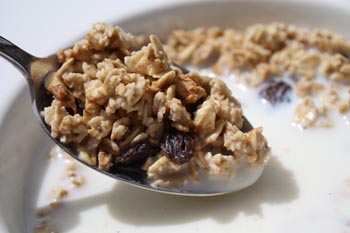Nutrition Questions & Answers with Ingles Dietitian Leah McGrath, RD, LDN
 Dear Leah,
Dear Leah,
What is the best milk product for people with diabetes to drink? Also does Ingles carry milk in 8 oz. containers?
~ Bob
Dear Bob,
Though liquid milk has protein it also has about 12 grams of carbohydrates from the milk sugar (lactose) in each glass. You can certainly drink milk, but you would need to count the grams of carbohydrates. There are other options like soy milk and almond milk but often they are sweetened, so you would need to purchase the unsweetened versions to get fewer carbohydrates. Ingles does sell milk in 8-oz. “grab-n-go” -type containers both in the dairy section and in the grocery aisle.
Dear Leah,
Thanks for all the practical information on the Ingles website and the
messages I hear while shopping at Ingles! What’s the difference between
“fiber”, “dietary fiber”, “soluble” and “insoluble” fibers, etc…, and
does it make a difference?
~ Michelle
Dear Michelle,
Fiber as you see it on the label is dietary fiber and is listed in grams
on the nutrition facts label. The type of fiber may be soluble or
insoluble, though you may not know which as it is often not broken down.
Soluble fiber forms a gum-like substance in your intestines as it moves
through your digestive tract.
It is believed that soluble fiber helps lower cholesterol. Some examples
of soluble fiber are pectin (the substance between the skin and the
meat of an apple), oatmeal, and beans. Insoluble fiber would basically
pass in and out of your digestive system with very little being done to
it. Some examples of insoluble are skins and peels of fruits and
vegetables, and the seeds in berries.
Insoluble fiber helps “clean you out”; it’s the roughage your
grandmother talked about. Both types of fiber help make you feel more
full. Both help slow the rise of your blood sugar. Carbohydrates (bread,
cereal, rice, pasta, fruits, vegetables, beans, etc.) with more fiber
have a lower glycemic index, this means that they affect your blood
sugar more slowly. This is useful for diabetics in their meal planning.
Dear Leah,
We have just found out that my husband has Type 2 diabetes. I don’t even
know where to start to change his diet. What should I look for on the
labels?
~ Donna
Dear Donna,
I am sure you are a bit overwhelmed. There is no reason for your husband
to eat any differently than the rest of the family, provided you follow
a heart-healthy diet. Some good resources for you are the American
Diabetes Association (www.diabetes.org) as well as your local American
Diabetes Association.
Your doctor should have referred your husband for educational classes to
help manage his blood sugar. The keys to managing blood sugar and
avoiding complications of diabetes are:
• Taking medications as necessary and directed
• Weight loss if needed
• Regular exercise
• Checking blood sugar regularly at home
• Eating a balanced diet and learning how to count carbohydrates
The latter is key to keeping his blood sugar in line. This is where a
dietitian (RD) or certified diabetic educator (CDE) can help. They will
develop a calorie and carbohydrate goal per day and then per meal.
Both of you will have to pay attention to the carbohydrates (bread,
cereal, rice, pasta, fruits, starchy vegetables, beans, milk, yogurt,
and simple sugars like candy, cookies, cakes, sweet tea, regular sodas,
etc.) that he eats, as all carbohydrates eventually break down to simple
sugars and will affect his blood sugar. Do not go out and buy a ton of
sugar-free cookies and candies — this will not help him and the sugar
alcohols will cause gas bloating and diarrhea!
Dear Leah,
What types of products does Ingles carry for vegetarians?
~ Kathy
Dear Kathy,
We carry lots of vegetarian items, though to a certain extent it depends
on the size of the store. If there are specific products you want,
please take information (name of product, manufacturer, size, etc.) on
those products to the store manager. Often these items are in our
warehouse so they can easily be ordered for you and delivered to your
store.
In the dairy and produce sections we have items like soy, almond, and
rice milk, soy yogurt, and soy cheeses. We carry tempeh, tofu, and other
vegetarian meat replacements in the grocery, produce, and frozen foods
sections, which also contain vegetarian entrées by manufacturers like
Amy’s.
 Leah McGrath, RD, LDN
Leah McGrath, RD, LDN
Corporate Dietitian – Ingles Supermarkets
Phone: 800-334-4936
e-mail:
[email protected]
[email protected]
[email protected]
Ingles: www.ingles-markets.com/ask_leah
Twitter: www.twitter.com/InglesDietitian
Facebook: www.facebook.com/inglesmarkets







